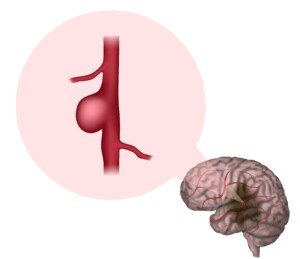
How can you tell if that sudden, alarming headache is an aneurysm headache?
Can a headache hurt really bad and still be normal?
Does an aneurysm headache feel different than a normal, regular headache?
If you’re worried about your headaches possibly coming from aneurysms, then you likely already know to some extent just what an aneurysm is:
a blood-filled portion of a blood vessel, that causes it to “balloon” up into a sac-like structure; or, the blood-filled portion can be cylindrical in shape.
Nevertheless, an aneurysm has the potential, especially as it gets bigger, to rupture. The rupture may cause an alarming headache.
An aneurysm leak may also be over a period of days. A ruptured or leaking aneurysm is a life-threatening medical emergency.
Where do aneurysms come from?
“Aneurysms can either be developmental or acquired,” says Carol Redillas, MD, founder of Crescent City Headache and Neurology Center.
“A person can have an inherited weakness of the vascular wall, and develop an aneurysm with repeated, longstanding hemodynamic stress on the vascular wall.
“There are conditions that have been associated with an increased incidence of aneurysms such as connective tissue disorders, fibromuscular dysplasia, polycystic kidney disease, aortic coarctation, etc.
“Furthermore, trauma, infection, and cocaine use are also risk factors for developing aneurysms later in life.”
Can a person have an aneurysm for years and not know it?
“People can harbor an aneurysm without knowing it, as most are asymptomatic and are incidentally found only when a brain MRA is performed,” explains Dr. Redillas.
“They become symptomatic only when they reach a certain size and rupture or leak.”

Shutterstock/Veronika Zakharova
Do ruptured aneurysms always cause headaches?
“Aneurysms don’t always present with headaches, but those that rupture do. Before eventual rupture, aneurysms typically ‘leak’ and present with a sudden onset headache, i.e., sentinel headache,” says Dr. Redillas.
“Aneurysms that are located near the posterior communicating artery typically present with ptosis (drooping eyelid) and/or miosis (constricted pupil) without any headache at all.”
If a rupturing or leaking aneurysm is presenting with a headache, is it rare, then, for the headache to be the only symptom?
“A leaking aneurysm may present with headache as the sole symptom, but those that rupture may also be associated with change in mental status, loss of consciousness, seizures, meningismus or other focal neurological deficits, depending on the site of involvement.”
If someone has a severe headache seemingly out of nowhere, should they worry it might be an aneurysm rupture/leak?
“People always think that they have an aneurysm when they experience a severe headache,” says Dr. Redillas.
“The truth is, about 98% of headaches are due to a primary headache disorder such as migraine, cluster, tension type, etc.
“Headaches that have been present for years or even months are most likely migraines or tension type.
“Aneurysms are suspected only when a patient presents with a sudden-onset severe headache which may or may not be associated with ptosis, miosis, meningismus (neck stiffness and intolerance of bright light, with headache).

Ptosis: drooping eyelid
“However, pain is very subjective: a 5/10 pain for one may be a 10/10 for another; thus, a very unreliable way to diagnose headache.
“But if somebody presents with a new onset headache that is severe, especially those associated with exertion, an aneurysm should always be ruled out with further studies.
So if someone has had migraines or cluster headaches for years, how can they tell if that next sudden painful headache might be an aneurysm?
“Neurologists and headache specialists always look for a significant change in headache character, i.e., change in quality, location, associated symptoms, etc., to exclude other secondary causes.
“Aneurysmal headaches are typically short-lived because they usually rupture when it reaches a certain size.
“Thus, you don’t see a patient with a 10 year history of headaches due to an aneurysm.
“Aneurysms can also rupture with Valsalva’s maneuver (holding breath during physical exertion) such as straining, sexual activity, etc.”
So if an aneurysm headache is “short-lived,” can you elaborate?
And…suppose someone suddenly gets a “thunderclap” or severe headache…
It’s so bad it makes them stop cold what they are doing, but there are NO other symptoms.
At what point, then, should this person head to the ER?
After all, a benign headache can present in a very sudden, painful way.
And what if this individual doesn’t even have a history of sudden, severe headaches?
Dr. Redillas explains, “Aneurysmal headaches are usually ‘short-lived,’ like a thunderclap.
“However, not all patients with thunderclap headaches have an aneurysm, as these can also be seen in crash migraines, pituitary apoplexy, meningitis, increased or decreased intracranial pressure, thyroid disorders, etc.
“Patients are usually conscious with aneurysms that leak, and leaks can precede rupture by several days or even weeks.
“They can have a sentinel headache today, be symptom-free or headache free for weeks, then quickly deteriorate when the aneurysm ruptures.
“The best advice is, if you never had any significant headaches in the past, or this headache feels different than your usual headaches, it is better to have it checked than be sorry when you end up dead.
“If an MRA or a 4 vessel angiogram is negative for an aneurysm and the same headache recurs, then you can be rest assured that your headache is most likely benign.”
Dr. Redillas served as the head of the headache division at Ochsner Medical Center for over 10 years. In addition to headaches, she also treats a variety of other neurological conditions.
served as the head of the headache division at Ochsner Medical Center for over 10 years. In addition to headaches, she also treats a variety of other neurological conditions.
 Lorra Garrick has been covering medical, health and personal security topics for many years, having written thousands of feature articles for a variety of print magazines and websites. She is also a former ACE-certified personal trainer.
Lorra Garrick has been covering medical, health and personal security topics for many years, having written thousands of feature articles for a variety of print magazines and websites. She is also a former ACE-certified personal trainer.
Top image: Shutterstock/Syda Productions
Cause of One Pupil Temporarily Dilated, No Response to Light
Can Aneurysm Cause One Pupil to Be More Dilated than the Other?













